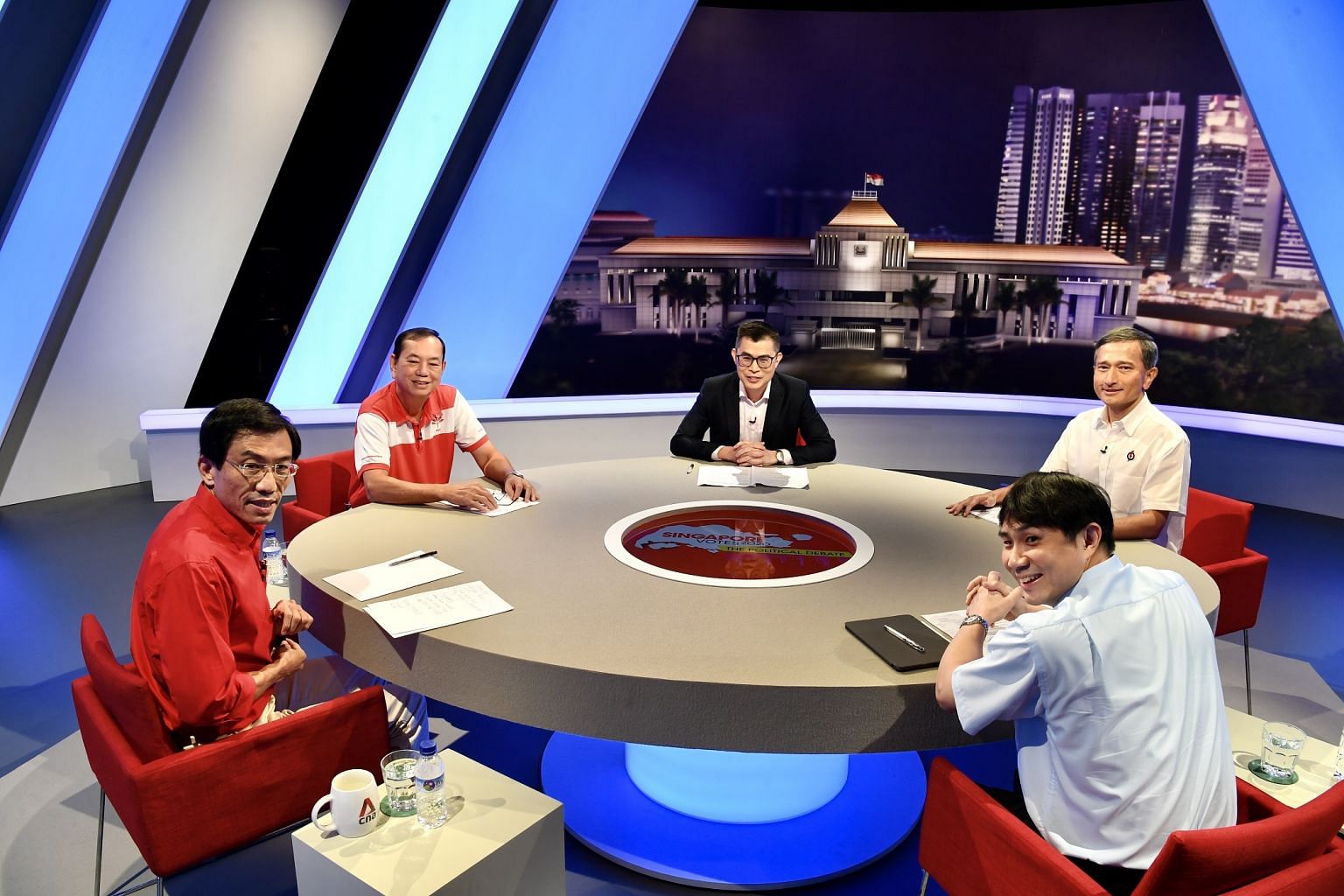Singapore GE2020: WP has done the math on its proposals, says Jamus Lim in live TV debate
Sign up now: Get ST's newsletters delivered to your inbox

Taking part in the debate are (clockwise, from left) SDP's Dr Chee Soon Juan, PSP's Francis Yuen,.moderator Jamie Ho, PAP's Dr Vivien Balakrishnan, and WP's Jamus Lim.
ST PHOTO: DESMOND FOO
SINGAPORE - The Workers' Party (WP) has been called "PAP-lite" because of how similar its positions are to the ruling party, but the opposition party's more left-wing stance raises the question of how it would pay for its programmes, said Foreign Affairs Minister Vivian Balakrishnan in a live TV debate on Wednesday (July 1).
Key proposals in WP's manifesto for the General Election include scrapping the proposed Goods and Services Tax (GST) hike, introducing a national minimum wage as well as a redundancy insurance scheme, and lowering the cost of intermediate and long-term care for patients whose monthly household per capita income is below $3,200, among others.
The People's Action Party "could have written this manifesto", noted Dr Balakrishnan, 59, in the second half of the hour-long debate, a question and answer format that allowed the candidates to put questions to him and vice versa.
That WP's Jamus Lim was seated to his left during the debate was not lost on viewers as Dr Balakrishnan added: "And that's why people have called the Workers' Party PAP-lite or PAP-like, it's almost a position where whatever line or stand the PAP has taken, you basically use that as your reference point and take a half step to the left."
But that half step left raises fiscal questions, he noted, on the trade-off with costs and who would pay for them.
In response, Dr Lim, an economics professor who is contesting Sengkang GRC in his first election, pointed that the WP has often emphasised it does "not necessarily object to policy for the sake of objection".
"Ultimately, what we want is the right policy... Now, you have then gone on to say that what we have done is move to the left, and the kind of underlying query is that well perhaps by moving to the left we are being irresponsible fiscally," said Dr Lim.
"I would like to emphasise within the manifesto we have actually done the math behind it and everything is within our budget, it actually is budget neutral. What is true though, is that it does entail a set of trade-offs."
Where the two parties fundamentally differ is "where we think those trade-offs actually should occur", added the 44-year-old.
"The PAP would tend to side on the side of the capital. We think, in fact, that for every dollar of national income, Singaporean workers already receive an insufficient amount - 42 cents compared to 55 cents in Japan, and much higher in other high income countries. And we think that a re-balance of that kind of share of labour income is ultimately necessary," he said.
In turn, Dr Lim asked if the PAP had evaluated the efficacy of its policies, and referred to Singapore Democratic Party's Chee Soon Juan's comment earlier in the debate that the PAP has tried to raise productivity unsuccessfully since 1972.
Pointing out that the Government has put aside 20 per cent of its GDP fiscal stimulus, Dr Balakrishnan, who is running in Holland-Bukit Timah, said that they are funding this not by "passing the burden to our children or grandchildren" but by dipping into Singapore's reserves.
"Our Pioneer and Merdeka generation always believed in spending less than they earn on a recurrent basis. That's why we have the reserves.
"And that's why we can deploy that for a rainy day. This is a rainy day."


